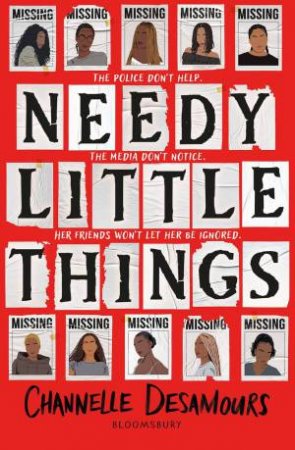Needy little things by Channelle Desamours

Sariyah has an unusual gift. Her brain constantly receives messages about other people’s needs. These are usually little things: Paper clip. Crayon. Shoelace. Chewing gum. She carries a ‘Santa bag’ to hand out items to needy persons, often even before they’ve become aware of their need. Thus the nail file she hands to the shop owner turns out to become a defence weapon when the woman is attacked at night. It’s a kind of ADHD; she is inattentive and distractible because her brain is overloaded with buzzing messages. Everything takes a horrible turn when her friend Deja goes missing and the last thing Sariyah handed her was a pepper spray.
There is a lot going on in Sariyah’s life: her parents live separately, her younger brother has sickle cell disease, and her mother is severely depressed. Sariyah, as eldest child, is the person that has to hold the family together. She and her best friend Malcolm are also grieving the loss of his sister Tessa, five years ago. Now that Deja has disappeared, another black girl gone missing, Sariyah and Malcolm want to make sure the police investigate thoroughly this time, and are determined to make her case go viral on social media.
Set in a black community in Atlanta, the story takes a little while to gather pace, but the mystery of Deja’s disappearance soon had me hooked. Desamours explores issues of racial profiling, the lack of public interest in a black disappearance compared to a similar case where a young white girl disappeared. The teenage protagonists are angry and frustrated at police disinterest and incompetence. Sariyah’s empathetic brain messages don’t help and only make her feel guilty and responsible for the train of events. There are hints of possible familial abuse, inappropriate relationships, abuse of drugs, the usual things that arise when someone goes missing, but the suspicions only swirl around the truth. Desamours’ novel makes good use of the mystery, speculative fiction genre, to explore many social issues in a way that is not confronting, and remains suitable for a YA audience.
Themes: Mystery, Missing person, Grief, Racism, Depression, Social media, Responsibility.
Helen Eddy